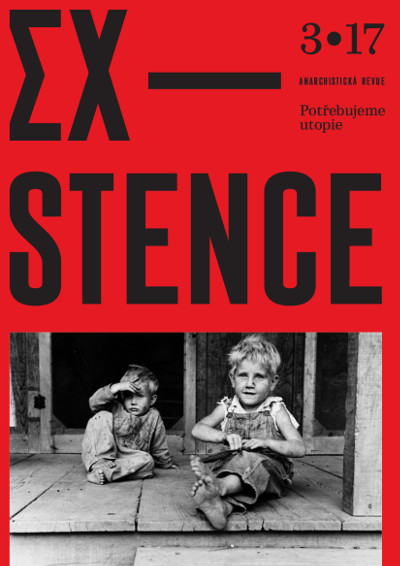BENEFIČNÍ SHITSOUND NIGHT VOL.II
Druhá benefiční SHITSOUND NIGHT v Brně na Sibiři. …(více)
The theme of the summer issue of Existence is “We Need Utopias”. In our opinion, imagination is essential to any resistance against authority or struggle for a better society.

The utopia as a literary genre dates back to the celebrated Thomas Moore’s work of the same name. It depicts imaginary societies around the world and in different time periods. A large part of utopian works is based on a fixed and immutable order. We are more interested in utopias that are characterised by freedom, openness and unforced work. Therefore, we follow anti‑authoritarian utopias and it is crucial for us to explain why they are so important.
The present is characterised by neoliberal hegemony and its claim that “there is no alternative”. This motto kills dreams, offers consumerist substitutes and announces the end of history. That is why it is so important to revive slogans of the 1968 Paris revolt: “All Power to the Imagination” and “Be Realistic, Ask the Impossible”. Dreams and actions we build upon them have the power to push back boundaries of the possible. A utopia of the past is the reality of the present. Anarchists are not in the habit of making detailed plans for the future societies. Our movement is based on the principles of freedom and equality. From them, we derive organisational procedures, structures and approaches. A utopia is primarily an attempt to formulate collective aspirations and desires, as well as it is a means of criticism of the present oppression and inequality for the classics of utopian literature.
We have chosen three texts that may serve as a starting point for further debates and ideas. Firstly, it is News from Nowhere (1890) by William Morris because of his notions of liberated work and other concepts that influenced his work. Secondly, we take you to Latin America where in 1914, in the midst of the Argentinian anarchist movement, Pierre Quiroule published his utopian essay La ciudad anarquista americana. Thirdly, the paper on Utopistics: Or, Historical Choices of the Twenty-first Century (1998) by sociologist Immanuel Wallerstein brings us the latest views on the utopian thinking. In addition, we have also included several comments from the works by Peter Kropotkin and text describing the utopian genre in the ancient Greece.
Not far from Europe, people fight for a utopia. Kurdish militias are courageously facing the Islamic State and, at the same time, they attempt to realise ideals of democratic confederalism on the territories they protect. Democratic confederalism is discussed in an interview with Ercan Ayboga by Janet Biehl.
The history of the anarchist movement is reflected in a thorough account of the International Anarchist Congress of Amsterdam in 1907. A theoretical text by Vadim Damier deals with a relationship between anarchism and nationalism. In an interview with Mikola Dziadok, he discusses the current situation inside the anarchist movement, repressions and resistance in Belarus. The interview is followed by an excerpt from his book “The Parallel World in Colour” that covers the sentence to solitary confinement in Belarusian prisons.
The issue contains reviews of a new feminist zine Drzost, the latest A-kontra issue and the book The Utopia of Rules by David Graeber. Last but not least, you may enjoy an overview of local anarchist events that have taken place over the past three months.
Druhá benefiční SHITSOUND NIGHT v Brně na Sibiři. …(více)
Tombola, přednášky a koncerty v brněnské Káznici …(více)
Workshop, na kterém bude představeny dvě organizace - Sdílené domy a Iniciativu nájemníků a nájemnic …(více)
15. - 17. 5. 2026, Rohozná u Jihlavy
18. ročník Fotbalu proti rasismu. …(více)
Rojava hoří, svět mlčí a Turecko profituje. Proč se kurdská autonomie nikomu nehodí
denikalarm.cz 26.1.2026Grónsko nechce jen Trump, ale také skupina amerických miliardářů, kteří by na anexi vydělali
denikalarm.cz 17.1.2026„Vypadněte z našeho města!“ Spojené státy jsou v šoku po zastřelení mladé ženy v Minneapolisu
denikalarm.cz 9.1.2026